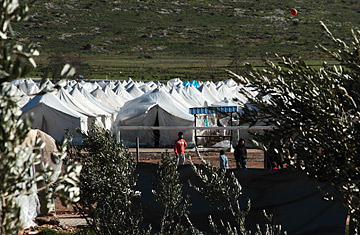
Syrian children play soccer inside a refugee camp in Reyhanli, Turkey, on March 4, 2012
"It's like moving people from death to life," says Raed Saleh, 27, describing the process of helping his fellow Syrians flee into Turkey. From his base at a refugee tent camp near Bosheen, a small Turkish village less than a mile away from the border, Saleh manages a network of lookouts and smugglers who alert him whenever a new group is en route. He doesn't speak Turkish himself, Saleh says, so he relies on another friend to phone the Turkish border guards before any refugees attempt to cross.
The Turks have been a great help, Saleh says, providing minibuses and ambulances, and ferrying the Syrians to one of the six camps scattered along the border. They have also become a deterrent. Syrian government soldiers, who have been known to fire at refugees, tend to think twice when a Turkish border guard is in sight.
Saleh has no complaints about conditions inside the camps. "The food is fine, the tents are fine, and we manage to keep warm in the winter," he says. "And most importantly, we are all safe." Nearly 11,000 Syrians reside in the camps, with the number expected to rise in the coming days as a fresh wave of violence propels more refugees toward Turkey's doorstep. Turkish Foreign Minister Ahmet Davutoglu has pledged that his country's doors will remain open "to all Syrians who want to flee from oppression."
Yet more rows of tents come into view a short drive from Bosheen, past half-built houses and flooded fields (the Syrian authorities have reportedly opened the dams on the Asi River, turning a rivulet into a swelling lake and an additional obstacle). The tents are the headquarters of Colonel Riad al-Asaad and other leaders of up to 40,000 antiregime rebels known as the Free Syrian Army (FSA). Turkey keeps a tight lid over al-Asaad, limiting his communication with media and restricting access to his camp. Perhaps with good reason. On March 1, a Turkish newspaper reported that the country's intelligence service had foiled an attempt by Syrian agents to kidnap the colonel.
For months, speculation has been rife that aside from sheltering the FSA leadership Turkey may be arming and training the rebels. Ayham al-Kurdi could only wish that the rumors were true. "All the help we received to date was to be allowed to be based in Turkey, nothing more," says al-Kurdi, 30, a rebel commander, over tea and cigarettes at an office on the outskirts of Antakya. "The Turkish government is undecided as to what to do," he complains. "Our wish is that they come to a decision."
Maher Nouaimi, an FSA spokesperson, is just as exasperated. "We have had no support from the Turkish government," he yells into his cell phone. "We have seen Russia giving cash and weapons to the Syrian regime, but we've received nothing."
Whatever the extent of its links with the FSA, Ankara's backing for Syria's political opposition has been explicit. Having initially kept it at arm's length, Turkey has taken a much closer interest in the opposition since the birth of the Syrian National Council (SNC), the leading alliance of antiregime activists, last October. Based in Istanbul, the SNC has enjoyed regular contacts with Davutoglu and other Foreign Ministry officials. According to Khaled Khoja, an SNC member, the group has largely Ankara to thank for its recognition by the Arab League as "a legitimate representative of the Syrian people." The SNC will lobby to be designated the Syrian people's "sole" representative during an upcoming Friends of Syria conference in Istanbul.
Despite the political support they have lent it, the Turks have not made any attempt to micromanage the opposition, says Khoja. "They have not intervened in our work," he says, nor have they favored one group over another. However, "they have encouraged us to be more inclusive, to try to maintain a united front."
